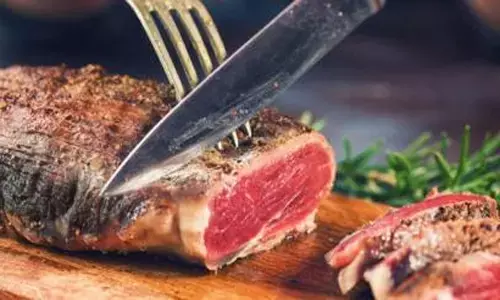- Home
- Medical news & Guidelines
- Anesthesiology
- Cardiology and CTVS
- Critical Care
- Dentistry
- Dermatology
- Diabetes and Endocrinology
- ENT
- Gastroenterology
- Medicine
- Nephrology
- Neurology
- Obstretics-Gynaecology
- Oncology
- Ophthalmology
- Orthopaedics
- Pediatrics-Neonatology
- Psychiatry
- Pulmonology
- Radiology
- Surgery
- Urology
- Laboratory Medicine
- Diet
- Nursing
- Paramedical
- Physiotherapy
- Health news
- Fact Check
- Bone Health Fact Check
- Brain Health Fact Check
- Cancer Related Fact Check
- Child Care Fact Check
- Dental and oral health fact check
- Diabetes and metabolic health fact check
- Diet and Nutrition Fact Check
- Eye and ENT Care Fact Check
- Fitness fact check
- Gut health fact check
- Heart health fact check
- Kidney health fact check
- Medical education fact check
- Men's health fact check
- Respiratory fact check
- Skin and hair care fact check
- Vaccine and Immunization fact check
- Women's health fact check
- AYUSH
- State News
- Andaman and Nicobar Islands
- Andhra Pradesh
- Arunachal Pradesh
- Assam
- Bihar
- Chandigarh
- Chattisgarh
- Dadra and Nagar Haveli
- Daman and Diu
- Delhi
- Goa
- Gujarat
- Haryana
- Himachal Pradesh
- Jammu & Kashmir
- Jharkhand
- Karnataka
- Kerala
- Ladakh
- Lakshadweep
- Madhya Pradesh
- Maharashtra
- Manipur
- Meghalaya
- Mizoram
- Nagaland
- Odisha
- Puducherry
- Punjab
- Rajasthan
- Sikkim
- Tamil Nadu
- Telangana
- Tripura
- Uttar Pradesh
- Uttrakhand
- West Bengal
- Medical Education
- Industry
Replacing red meat with plant foods, dairy products lowers heart disease risk: BMJ

USA: Consuming high quality plant foods such as soy, legumes, or nuts in place of red meat may help lower the risk for coronary heart disease (CHD), finds a recent study in the journal BMJ. Substituting dairy products and whole grains for total red meat, and eggs for processed red meat may also reduce CHD risk.
Th study conducted on 43,272 U.S. men was based on 30 years of observation.
Increased evidence from studies have suggested red meat consumption to be associated with higher mortality risk. The reduced risk was however not seen in the Asian population which consumes low amount of red meat. These inconsistencies could be due to several factors.
Energy intake of most of the population comes from refined starches, potatoes, sugar, and fats that are highly saturated or partially hydrogenated. Thus analyses that fail to specify comparison foods by default mainly compares red meat with these suboptimal sources of energy intake, Therefore, lack of an association of red meat with disease outcomes simply implies that red meat is as unhealthy as these alternative foods. To address these inconsistencies, Walter C Willett, professor of epidemiology and nutrition, Harvard TH Chan School of Public Health, Boston, MA, USA, and colleagues studied total, processed, and unprocessed red meat in relation to risk of coronary heart disease (CHD) and to estimate the effects of substituting other protein sources for red meat with CHD risk.
For the purpose, the researchers conducted a prospective cohort study with repeated measures of diet and lifestyle factors. The participants were from Health Professionals Follow-Up Study cohort, United States, 1986-2016.
The study included 43 272 men without cardiovascular disease or cancer at baseline. The primary outcome was total CHD, comprised of acute non-fatal myocardial infarction or fatal CHD
Substitution analyses were conducted by comparing coefficients for red meat and the alternative food in models, including red meat and alternative foods as continuous variables.
Key findings of the study include:
- During 1 023 872 person years of follow-up, 4456 incident CHD events were documented of which 1860 were fatal.
- After multivariate adjustment for dietary and non-dietary risk factors, total, unprocessed, and processed red meat intake were each associated with a modestly higher risk of CHD (hazard ratio for one serving per day increment: 1.12 for total red meat, 1.11 for unprocessed red meat, and 1.15 for processed red meat).
- Compared with red meat, the intake of one serving per day of combined plant protein sources (nuts, legumes, and soy) was associated with a lower risk of CHD (0.86) compared with total red meat, 0.87 compared with unprocessed red meat, and 0.83 compared with processed red meat).
- Substitutions of whole grains and dairy products for total red meat and eggs for processed red meat were also associated with lower CHD risk.
"We found that greater intakes of total, unprocessed, and processed red meat were each associated with a higher risk of CHD. These findings are consistent with the effects of these foods on low density lipoprotein cholesterol levels and support a health benefit of limiting red meat consumption and replacement with plant protein sources; this would also have important environmental benefits," wrote the authors.
"Further research on the substitution of dairy products and egg intake for red meat are needed in other cohorts to confirm the generalizability of these findings," they concluded.
"Red meat intake and risk of coronary heart disease among US men: prospective cohort study," is published in the journal BMJ.
DOI: https://www.bmj.com/content/371/bmj.m4141
Dr Kamal Kant Kohli-MBBS, DTCD- a chest specialist with more than 30 years of practice and a flair for writing clinical articles, Dr Kamal Kant Kohli joined Medical Dialogues as a Chief Editor of Medical News. Besides writing articles, as an editor, he proofreads and verifies all the medical content published on Medical Dialogues including those coming from journals, studies,medical conferences,guidelines etc. Email: drkohli@medicaldialogues.in. Contact no. 011-43720751


